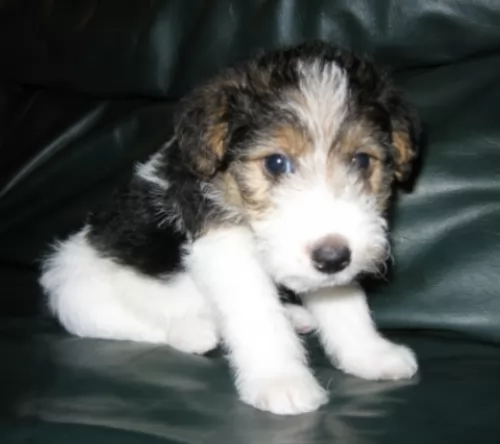 Petzlover
Petzlover Dutch Shepherd is originated from Netherlands but Wire Haired Fox Terrier is originated from United Kingdom. Dutch Shepherd may grow 24 cm / 10 inches higher than Wire Haired Fox Terrier. Dutch Shepherd may weigh 23 kg / 51 pounds more than Wire Haired Fox Terrier. Both Dutch Shepherd and Wire Haired Fox Terrier has almost same life span. Dutch Shepherd may have more litter size than Wire Haired Fox Terrier. Both Dutch Shepherd and Wire Haired Fox Terrier requires Moderate Maintenance.
Dutch Shepherd is originated from Netherlands but Wire Haired Fox Terrier is originated from United Kingdom. Dutch Shepherd may grow 24 cm / 10 inches higher than Wire Haired Fox Terrier. Dutch Shepherd may weigh 23 kg / 51 pounds more than Wire Haired Fox Terrier. Both Dutch Shepherd and Wire Haired Fox Terrier has almost same life span. Dutch Shepherd may have more litter size than Wire Haired Fox Terrier. Both Dutch Shepherd and Wire Haired Fox Terrier requires Moderate Maintenance.
 The Dutch Shepherd is of Dutch origin, hailing from the Netherlands. They were originally used as herding dogs on the farms, where they became a jack-of-all-trades type of dog.
The Dutch Shepherd is of Dutch origin, hailing from the Netherlands. They were originally used as herding dogs on the farms, where they became a jack-of-all-trades type of dog.
The Dutch Shepherd in those days, 100 odd years ago, were also known as Hollandse Herders.
These dogs are more rare in modern days, but when you do find them, they are being used as police or security dogs, as guides for the blind, or simply as family friends.
 The Wire Haired Fox Terrier originates in England, and it is thought that the dog developed from the white English Terrier being crossed with the Bull Terrier and maybe even the Beagle.
The Wire Haired Fox Terrier originates in England, and it is thought that the dog developed from the white English Terrier being crossed with the Bull Terrier and maybe even the Beagle.
The hunting crowd wanted a dog that was small enough to disappear down a hole to flush out a fox.
Even though the Wire Haired Fox Terrier used to be a pet of Queen Victoria as well as King Edward VII, it only became popular as a family pet in the 1930s.
 The Dutch Shepherd dog is very similar in appearance to the popular German Shepherds, being a medium to large sized dog.
The Dutch Shepherd dog is very similar in appearance to the popular German Shepherds, being a medium to large sized dog.
The males are slightly heavier than females, but both males and females can stand between 55 and 62cm and weigh between 20 and 32kg.
There are actually 3 varieties found in the Dutch Shepherd dogs - short-haired, long-haired, and wiry or rough-haired. The dog has a double coat, consisting of a woolly undercoat and a top coat. The basic color of the coat is gold or silver through to red, giving rise to the brindle variations. Too much black or white seen in the fur is considered a fault.
In 1914 it was decided that brindle coats would distinguish them from the others.
The eyes of the Dutch Shepherd are dark, almond shaped and slightly slanting, while the medium sized ears are erect and high on the head and the thick tail is slightly curved. The dog has an unusually long tongue which is often found hanging out.
Early training and socializing for this dog is important so that he can learn to stay calm around new people, or visitors to the property.
The beautiful Dutch Shepherd doesn’t like being left alone for too long, loving rather to be involved with all that the family is involved in. They get on well with other pets in the home as well as being child-friendly.
They are happy dogs, who can also be smart and cunning, therefore highly trainable. They soak up new commands easily. Dutch Shepherds are also good watchdogs as they are fiercely loyal, and do not take kindly to strangers.
 The Wirehaired Fox Terrier is a medium-sized dog, standing at between 33 and 38cm in height and weighing between 6 and 9 kg.
The Wirehaired Fox Terrier is a medium-sized dog, standing at between 33 and 38cm in height and weighing between 6 and 9 kg.
The face is fairly long and he has semi-erect, semi-floppy ears and the high set tail is usually docked. The double coat is wiry, curly and coarse and is essentially white with tan or black markings. White is always the predominant color of the Wire Haired Fox Terrier.
This little dog is cheerful, cheeky, playful, feisty, lovable and full of the joys of life. He is also strong-willed and independent.
He makes a great playmate for kids and loves being in the company of his human family. He will get on well with other pets in the family too.
He is intelligent which means you can have him easily trained and socialized and the kids will love to teach him some tricks too. He is a high energy dog and will require a good dose of exercise.
 Your alert, intelligent and somewhat rare Dutch Shepherd is a loyal, protective dog, and while he can be aggressive around intruders and be a great guard dog, he can also be a gentle, loving animal around his human family members.
Your alert, intelligent and somewhat rare Dutch Shepherd is a loyal, protective dog, and while he can be aggressive around intruders and be a great guard dog, he can also be a gentle, loving animal around his human family members.
Though his tongue is long and often hangs out, you won’t have to contend with drooling. He is a wonderfully active dog and doesn’t easily gain weight. He isn’t a barker or howler, and his exceptional intelligence makes him highly trainable.
Whether there are children or other animals in the house, you can rely on your Dutch Shepherd to get on well with them, making him a wonderful family pet and canine friend.
 One thing is for sure – when you bring a Wire Haired Fox Terrier into your home, you’re going to have a dog with endless energy. It is why they make such good pets when you’ve got kids in the house.
One thing is for sure – when you bring a Wire Haired Fox Terrier into your home, you’re going to have a dog with endless energy. It is why they make such good pets when you’ve got kids in the house.
They like to please their owners and they respond well to training and socialization. They’re also brave and protective, making good watchdogs.
They’re loving, loyal and companionable, and there are plenty of stories about the loyalty of these dogs. Anyone who has had one of them as a pet will tell you what splendid dogs they are.
 The Dutch Shepherd dogs are the healthiest of the Shepherd breeds. They have relatively few health problems.
The Dutch Shepherd dogs are the healthiest of the Shepherd breeds. They have relatively few health problems.
However, like the German Shepherds they may develop hip dysplasia, but this is in fact fairly rare. Get your pet to the vet if you suspect this in your dog because it can lead to lameness.
In 2018 the University of Minnesota identified a disease in Dutch Shepherds called Miositis. This is an inflammatory myopathy causing painful inflammation of the skeletal muscle tissue.
 These robust little dogs can succumb to any one of the many common dog illnesses there are -
These robust little dogs can succumb to any one of the many common dog illnesses there are -
The Wirehaired Foxy is a healthy dog, but it is thought that Epilepsy could be a problem with this breed. Your spunky dog may seem a little bit confused before he falls to the floor lying on his side and twitching like he’s having a bad dream.
This is brought on by uncontrolled bursts of electrical activity in the dog’s brain. The seizure can last for a minute or so but even so, whether it is a twitch or violent shuddering, it can leave you shocked and disturbed.
He can sometimes even urinate during the seizure. It is imperative to get your pet to the vet who will know precisely how it can be controlled.
Dental disease is also a common problem with dogs and unfortunately, your Wire Haired Fox Terrier also battles with this. The problem starts with tartar build-up on the teeth and then it can cause infection of the gums and roots of the teeth.
Left unattended to, your pet could lose his teeth, and it jeopardizes your pet’s health as well.
 Unfortunately Dutch Shepherds shed quite a bit of hair during their shedding period in spring and autumn. This makes regular brushing important during these seasons so as to remove the dead hairs, especially from the undercoat.
Unfortunately Dutch Shepherds shed quite a bit of hair during their shedding period in spring and autumn. This makes regular brushing important during these seasons so as to remove the dead hairs, especially from the undercoat.
The wire- or rough-haired variety shouldn’t be brushed but should rather be groomed by a professional groomer every 6 months or so.
Their nails need to be trimmed when necessary, to avoid cracking, splitting, or an injury.
Their ears can be cleaned weekly to get rid of any debris or wax build-up. This, if left, can lead to infection. Brush his teeth 2 or 3 times a week to avoid dental disease which brings on a host of illnesses.
These dogs do need regular exercising, and at the same time need to be physically and mentally stimulated. He is the kind of dog that has been used for herding purpose on the farm and he just craves activity. Take him with you on your walks and include him in ball games, hikes, jogging, swimming or when you go cycling – he is game for all kinds of activities.
The formula for their diet would be that of a medium to large dog with high energy levels. The top commercially manufactured foods have been developed to include all the important vitamins and minerals. Fish oil can also be added to their food to keep the coat shiny.
Add in cooked rice, cooked vegetables and chicken from time to time and be sure to add in some raw meat occasionally to prevent problems with the skin. Always ensure that your pet has fresh, cool water to drink.
 Groom your pet. Brush twice weekly. Wire Haired Fox Terrier owners like to hand their pets in at professional groomers to have their hair cut short and made more manageable. The hair is kept quite long around the muzzle.
Groom your pet. Brush twice weekly. Wire Haired Fox Terrier owners like to hand their pets in at professional groomers to have their hair cut short and made more manageable. The hair is kept quite long around the muzzle.
Provide your pet with the best food there is. Always buy high quality food that can contribute to your pet’s health and which is suitable for his size, age and activity levels. The Wire Haired Fox Terrier is inclined to be a greedy dog and with a dog like this weight gain can slowly increase and can become a health problem.
Spay or Neuter. This is an excellent idea for your pet if you don’t want puppies. Not only that, spaying or neutering actually decreases the likelihood of your pet getting some types of cancer.